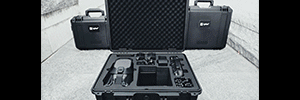This video brings up important issues regarding remote ID
You are using an out of date browser. It may not display this or other websites correctly.
You should upgrade or use an alternative browser.
You should upgrade or use an alternative browser.
Remote ID
- Thread starter yankfanp
- Start date
Hermey
Well-Known Member
Something happened at the end of June that many people may not realize the significance of, which can powerfully effect this and so many other issues.... it was a US Supreme Court decision on a case called West Virginia vs. EPA. https://www.supremecourt.gov/opinions/21pdf/20-1530_n758.pdf
This case was absolutely massive in its implications. The case essentially said that the EPA could not make its own regulations, but that it was Congress, eg our elected representatives, which needed to do that. The significance of this, is that by extension, this court case could be seen to be implying that this is true of all the federal 3-letter agencies. Now I don't know much about the Remote ID situation as I haven't been following it, but if there are any lawsuits on the matter still active, I would anticipate that any diligent attorneys should seek to update their pleadings by citing the West Virginia v EPA case. The implication of the West Virginia v EPA case on this Remote ID issue, is that the FAA itself *might* not be able to make regulations, such as Remote ID regulations, or really any regulations, if the 3-letter agencies are restricted in the way that the West Virginia v EPA case suggested they all should be. It might turn out that all regulations have to be made by Congress, our elected representatives.
Now I don't know if that would definitely be the interpretation of this court case on the present matter or not, but it is very much a possible reading of this court opinion. So I will be curious to see how all this unfolds.
This case was absolutely massive in its implications. The case essentially said that the EPA could not make its own regulations, but that it was Congress, eg our elected representatives, which needed to do that. The significance of this, is that by extension, this court case could be seen to be implying that this is true of all the federal 3-letter agencies. Now I don't know much about the Remote ID situation as I haven't been following it, but if there are any lawsuits on the matter still active, I would anticipate that any diligent attorneys should seek to update their pleadings by citing the West Virginia v EPA case. The implication of the West Virginia v EPA case on this Remote ID issue, is that the FAA itself *might* not be able to make regulations, such as Remote ID regulations, or really any regulations, if the 3-letter agencies are restricted in the way that the West Virginia v EPA case suggested they all should be. It might turn out that all regulations have to be made by Congress, our elected representatives.
Now I don't know if that would definitely be the interpretation of this court case on the present matter or not, but it is very much a possible reading of this court opinion. So I will be curious to see how all this unfolds.
Congress did, in fact, direct the FAA to implement the Remote ID requirements, as well as sUAS registrations, safety tests (TRUST), etc. So the West Virginia vs EPA ruling will have no impact on Remote ID.Something happened at the end of June that many people may not realize the significance of, which can powerfully effect this and so many other issues.... it was a US Supreme Court decision on a case called West Virginia vs. EPA. https://www.supremecourt.gov/opinions/21pdf/20-1530_n758.pdf
This case was absolutely massive in its implications. The case essentially said that the EPA could not make its own regulations, but that it was Congress, eg our elected representatives, which needed to do that. The significance of this, is that by extension, this court case could be seen to be implying that this is true of all the federal 3-letter agencies. Now I don't know much about the Remote ID situation as I haven't been following it, but if there are any lawsuits on the matter still active, I would anticipate that any diligent attorneys should seek to update their pleadings by citing the West Virginia v EPA case. The implication of the West Virginia v EPA case on this Remote ID issue, is that the FAA itself *might* not be able to make regulations, such as Remote ID regulations, or really any regulations, if the 3-letter agencies are restricted in the way that the West Virginia v EPA case suggested they all should be. It might turn out that all regulations have to be made by Congress, our elected representatives.
Now I don't know if that would definitely be the interpretation of this court case on the present matter or not, but it is very much a possible reading of this court opinion. So I will be curious to see how all this unfolds.
Hermey
Well-Known Member
Thanks! Didn't know that.Congress did, in fact, direct the FAA to implement the Remote ID requirements, as well as sUAS registrations, safety tests (TRUST), etc. So the West Virginia vs EPA ruling will have no impact on Remote ID.
In which case, a pertinent question would seem to be....are Remote ID requirements a violation of the 4th Amendment to the US Constitution, and I believe a good argument on this point could be made.
4th Amendment:
"The right of the people to be secure in their persons, houses, papers, and effects, against unreasonable searches and seizures, shall not be violated, and no Warrants shall issue, but upon probable cause, supported by Oath or affirmation, and particularly describing the place to be searched, and the persons or things to be seized."
Requiring the installation of software such that anyone with equipment to do so, could monitor your activity with a drone, to me appears to be a clear violation of the 4th Amendment vis a vis "unreasonable searches." Searches are permitted when a crime has occurred, but not before that.
spsphotos
Well-Known Member
Then every airplane out there is in violation of the 4th amendment. Once you are a Part 107, you are no longer an individual you are a commercial enterprise and this protection no longer applies.Thanks! Didn't know that.
In which case, a pertinent question would seem to be....are Remote ID requirements a violation of the 4th Amendment to the US Constitution, and I believe a good argument on this point could be made.
4th Amendment:
"The right of the people to be secure in their persons, houses, papers, and effects, against unreasonable searches and seizures, shall not be violated, and no Warrants shall issue, but upon probable cause, supported by Oath or affirmation, and particularly describing the place to be searched, and the persons or things to be seized."
Requiring the installation of software such that anyone with equipment to do so, could monitor your activity with a drone, to me appears to be a clear violation of the 4th Amendment vis a vis "unreasonable searches." Searches are permitted when a crime has occurred, but not before that.
Hermey
Well-Known Member
I think you misunderstood my point.Then every airplane out there is in violation of the 4th amendment. Once you are a Part 107, you are no longer an individual you are a commercial enterprise and this protection no longer applies.
I wasn't saying airplanes were in violation of the 4th amendment, I said Remote ID regulations requiring monitoring of drones that involved being able to find out who was flying exactly where, quite possibly would be. And I didn't say anything about Part 107, and neither do the Remote ID regulations. It's my understanding those Remote ID rules would apply to all drones over 250 grams, regardless if one is a hobbyist drone pilot or a commercial Part 107 pilot.
marshvet
Well-Known Member
Greg didn't mention one other question. Will DJI, for instance, be able to do a software update on relatively newly purchased drones? In other words, do they already have a module inside them that just has to be "turned on". And if so, which drones has this been fitted on - and how will someone know if their specific drone is so equipped?
spsphotos
Well-Known Member
He did touch on that. DJI has stated that all it takes to enable it is a firmware update. RID can use WiFi and Bluetooth, and most newer DJI Drones have Wifi.Greg didn't mention one other question. Will DJI, for instance, be able to do a software update on relatively newly purchased drones? In other words, do they already have a module inside them that just has to be "turned on". And if so, which drones has this been fitted on - and how will someone know if their specific drone is so equipped?
Can you provide the reference so that we can review it? ThanksCongress did, in fact, direct the FAA to implement the Remote ID requirements, as well as sUAS registrations, safety tests (TRUST), etc. So the West Virginia vs EPA ruling will have no impact on Remote ID.
Chip
Well-Known Member
- Joined
- Sep 11, 2017
- Messages
- 1,717
- Reactions
- 2,334
Yes, I drew that same conclusion from the discussion during the oral argument in the case of Race Day Quads v FAA, in December 2021, at WA DC Court of Appeals. The presiding judge raised serious questions about why the FAA needed to force drone pilots to emit a tracking signal while flying below 400 feet over private property especially in rural areas. The judge pressed the FAA's attorney to explain why such surveillance was necessary and said it clearly implicated the fourth amendement. My recollection is that the FAA attorney's justifcation for forcing remote ID everywhere in the country was because the government must be able to identify, track and catch the criminals who fly over property boundary lines through the air. Not a single word about "safety." IMHO, it was an extremely weak justifcation that runs directly contray to the FAA's mantra that there is no such thing as aerial trespass over private property. The court could issue its ruling anytime.I wasn't saying airplanes were in violation of the 4th amendment, I said Remote ID regulations requiring monitoring of drones that involved being able to find out who was flying exactly where, quite possibly would be.
Hermey
Well-Known Member
Sounds like the judge is very clear about the likelihood of FAA overreach, and 4th Amendment violation. I tend to think (and hope) that FAA will lose the case...anyway, we shall see... this looks like a good summary.Yes, I drew that same conclusion from the discussion during the oral argument in the case of Race Day Quads v FAA, in December 2021, at WA DC Court of Appeals. The presiding judge raised serious questions about why the FAA needed to force drone pilots to emit a tracking signal while flying below 400 feet over private property especially in rural areas. The judge pressed the FAA's attorney to explain why such surveillance was necessary and said it clearly implicated the fourth amendement. My recollection is that the FAA attorney's justifcation for forcing remote ID everywhere in the country was because the government must be able to identify, track and catch the criminals who fly over property boundary lines through the air. Not a single word about "safety." IMHO, it was an extremely weak justifcation that runs directly contray to the FAA's mantra that there is no such thing as aerial trespass over private property. The court could issue its ruling anytime.
RaceDayQuads LLC v. FAA (Lawsuit Challenging Drone Remote Identification Regulations)
Here's a good take on these kinds of issues from a drone attorney, at 10 minutes in she speaks on this case
"I think there's broadreaching things beyond Remote ID that this case could shake out" --she says at 14 minutes in
Can you provide the reference so that we can review it? Thanks
FAA Reauthorization Act of 2018 (H.R. 302)
RID doesn't have anything to do with safety as in flying over people either. Or preventing one quad from colliding into another. Or preventing quads and manned aircraft from having incursions which is the stated reason why the FAA would implement such a thing in the NAS. RID and ADS-B don't correspond or correlate to each other in any way. If I'm trying to use ADS-B to avoid other aircraft because somehow I'm going to be in their way with a quad is something that would need further explanation. The Rouge guys would be doing the see how far and high I can go.
I believe the FAA is allowing outside influences to make these kinds of decisions. Congress allowed the FAA, not Amazon, not FedEx, not UPS.
I believe the FAA is allowing outside influences to make these kinds of decisions. Congress allowed the FAA, not Amazon, not FedEx, not UPS.
Menthol
Member
- Joined
- Jul 11, 2018
- Messages
- 16
- Reactions
- 3
- Age
- 50
been trying to understand all the rules..
Scenario:
I have a MPP that is registerd as it weighs over over 250 gram. - Do I need to get a 3'rd party remote-id device for it to fly after september 2023?
Also I have a Mini 3 coming in that is under 250 grams and technically dont need to be registerd with FAA so no remote ID needed as I understand. But IF i choose to register it do I need to then get remote ID activated on the Mini 3? (or get a 3'rd party devide for it - that would make it iver 250 gram?)
Maybe that dont make any sense?
Scenario:
I have a MPP that is registerd as it weighs over over 250 gram. - Do I need to get a 3'rd party remote-id device for it to fly after september 2023?
Also I have a Mini 3 coming in that is under 250 grams and technically dont need to be registerd with FAA so no remote ID needed as I understand. But IF i choose to register it do I need to then get remote ID activated on the Mini 3? (or get a 3'rd party devide for it - that would make it iver 250 gram?)
Maybe that dont make any sense?
FAAs version of RID is not the same as DJI RID. The FAAs implementation is most likely a spaghetti ball and DJIs is a plausible prototype. If you use the mini for part 107, you'd need to register and RID it. And most likely you'll have to RID the MPP too. I say leave the part 107 and RID complications to just the MPP and keep the Mini underweight and unregistered.been trying to understand all the rules..
Scenario:
I have a MPP that is registerd as it weighs over over 250 gram. - Do I need to get a 3'rd party remote-id device for it to fly after september 2023?
Also I have a Mini 3 coming in that is under 250 grams and technically dont need to be registerd with FAA so no remote ID needed as I understand. But IF i choose to register it do I need to then get remote ID activated on the Mini 3? (or get a 3'rd party devide for it - that would make it iver 250 gram?)
Maybe that dont make any sense?
Menthol
Member
- Joined
- Jul 11, 2018
- Messages
- 16
- Reactions
- 3
- Age
- 50
That is absolutely my plan... not even register the Mini and keep the MPP registerd and RID's if needed with a 3rd party device if the law so demands. Not worried about the part 107 as I only fly for hobby and recreation no $$ coming in from flights... just going out as I buy more drone related stuffFAAs version of RID is not the same as DJI RID. The FAAs implementation is most likely a spaghetti ball and DJIs is a plausible prototype. If you use the mini for part 107, you'd need to register and RID it. And most likely you'll have to RID the MPP too. I say leave the part 107 and RID complications to just the MPP and keep the Mini underweight and unregistered.
PacificSkyDreamn
Well-Known Member
The FAA has a website listing drones that are in compliance with the RID standard. It's empty now. Should be interesting to watch as the September deadline approaches
Also the only way someone is going to be able to use the RID signal is via an app on their smartphone, and no one has even developed any RID reader apps yet.
Also the only way someone is going to be able to use the RID signal is via an app on their smartphone, and no one has even developed any RID reader apps yet.
D
Deleted member 165681
Guest
I registered my MINI 3 to be compliant with the law since I’ll be using those heavier batteries. I’m wondering the same as you.been trying to understand all the rules..
Scenario:
I have a MPP that is registerd as it weighs over over 250 gram. - Do I need to get a 3'rd party remote-id device for it to fly after september 2023?
Also I have a Mini 3 coming in that is under 250 grams and technically dont need to be registerd with FAA so no remote ID needed as I understand. But IF i choose to register it do I need to then get remote ID activated on the Mini 3? (or get a 3'rd party devide for it - that would make it iver 250 gram?)
Maybe that dont make any sense?
Below is a photo of my display as I turned on some RID settings yesterday. It is time to renew registration with FAA and it asked the question if my drone broadcasts an ID. I didn't think that was in the cards yet, but it does show an ID, with no flight information as I was hovering. Does this actually mean anything or is it just a "place holder" until things actually go live? Interestingly, the ID shown is the name the drone is registered with, but with a letter missing.
Attachments
Similar threads
- Replies
- 10
- Views
- 2K
- Replies
- 15
- Views
- 1K
- Replies
- 0
- Views
- 788
- Replies
- 5
- Views
- 891
- Replies
- 8
- Views
- 2K
DJI Drone Deals
1. Mini 2
2. Mini 3 Pro
3. Mini 4 Pro
4. Air 2s
5. Air 3
6. Avata 2
7. Mavic 3 Pro
8. Mavic 3 Classic
2. Mini 3 Pro
3. Mini 4 Pro
4. Air 2s
5. Air 3
6. Avata 2
7. Mavic 3 Pro
8. Mavic 3 Classic













